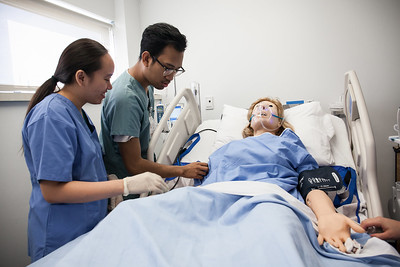Louisiana Delta Community College has partnered with Bastrop, LA to create a simulated hospital for LDCC nursing students. LDCC, in Monroe, LA is about 26 miles south of Bastrop. The simulated hospital will reside in a facility donated by the City of Bastrop. According to LDCC Chancellor Randy Esters, the simulator will be virtually indistinguishable from a real healthcare facility. LDCC nursing students will be able to complete their clinical rotations there.
Simulations in healthcare education are not new. Nursing programs have used simulated patients for years. Expanding the simulation concept to create an entire hospital is the next logical step for small nursing programs. While state legislatures (including Michigan’s) clamor about the need to allow community college nursing programs to confer bachelor’s degrees, the bottleneck in nursing education is not in the number of available seats in nursing schools. Nursing schools cannot easily expand the size of their academic programs because nursing students must complete clinical rotations. Finding adequate placements for nursing students can be tricky.
During a clinical rotation, student nurses must develop a minimum level of competence in delivering direct patient care safely. Health care providers will accept only a limited number of nursing students because registered nurses must supervise them. Hospitals already face significant challenges in keeping enough nurses on staff. Practically speaking, all hospital-based registered nurses supervise student nurses, but this supervisory responsibility complicates hospital operations and patient care delivery.
Additionally, most hospitals have a priority system for placing student nurses. Michigan Medicine, for example, gives highest priority to its own nursing students for clinical placements. Once all UM student nurses receive their rotations, Michigan Medicine places student nurses from UM-Flint. Students from other nursing programs have the lowest priority for clinical placement.
Simulated hospital could increase nursing program capacity
So, a simulated hospital that will suffice for meeting the clinical rotation requirement for licensure is – interesting. Community college nursing programs would not struggle to find clinical placements for their students with such a facility.
That’s not just a nicety, though. Right now, the Biden Administration is working to finalize rulemaking for Title IV funds. Currently, the proposed language would require institutions to provide “accessible” clinical or externship opportunities when required for program completion or licensure. In other words, Ed is looking to up the quality of students’ clinical experiences. Nursing programs with no direct connection to a hospital or health system may need to create a credible clinical experience for their nursing students.
WCC is not the only community college nursing program in this position. All 28 Michigan public community colleges offer a two-year nursing degree. Collaborating on regional hospital simulators would allow community college nursing programs to guarantee clinical placements for their students. It would also allow two-year schools to increase the number of nursing students they could admit to their programs. There may also be an opportunity for adaptive re-use of closed hospital or healthcare facilities to house such simulators. And the facility could also permit clinical simulations for allied health programs.
It would be nice if our community college administrators used the millions in COVID-19 assistance they received from the federal government to improve the nursing program. (Or any other academic program for that matter.) We need nurses, and we need to solve the capacity challenges that the clinical requirements create. Instead of using the federal money to address community needs, the administration used the money to bail out a gym.
(And we pay these people bonuses on top of their salaries.)
Photo Credit: Province of British Columbia, via Flickr


























